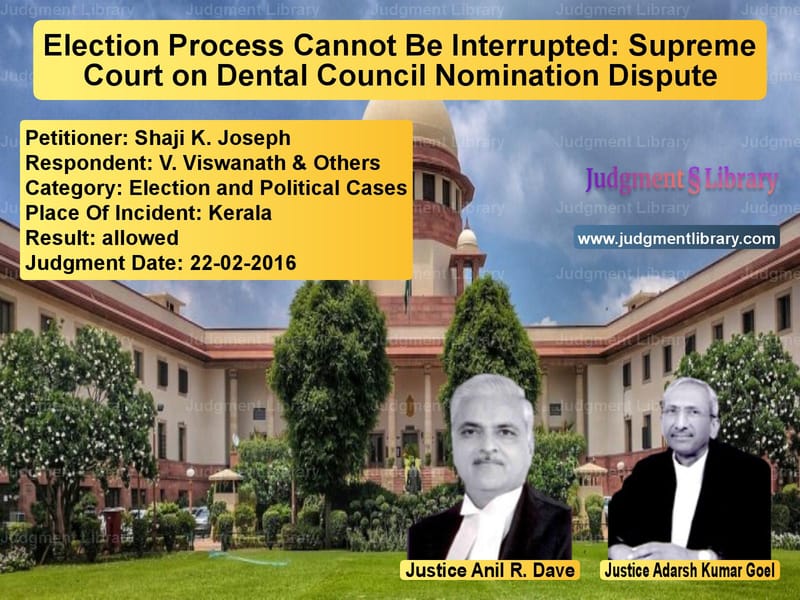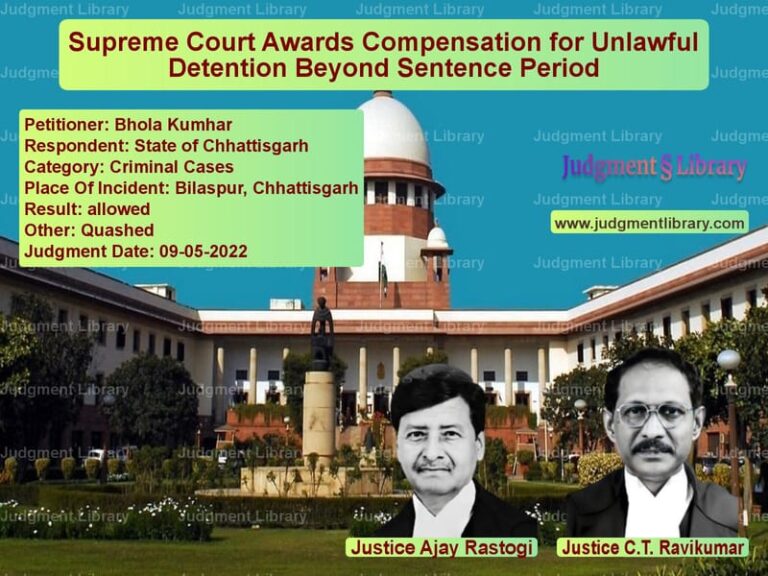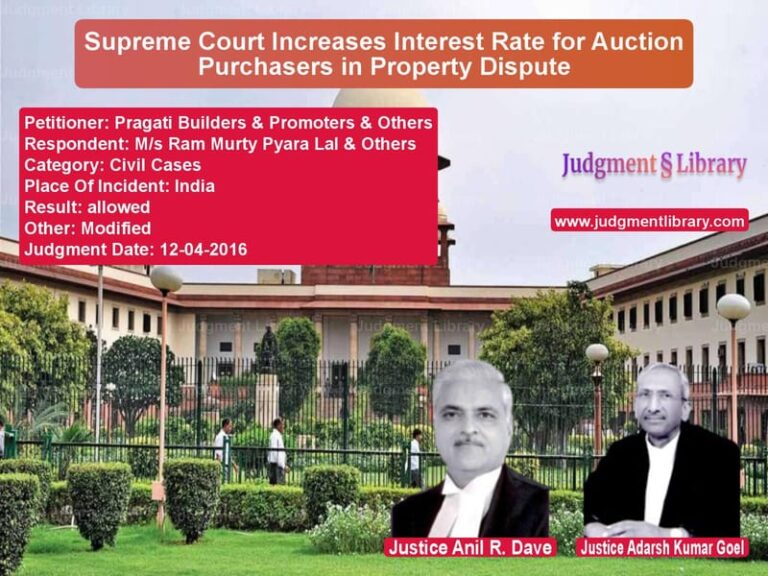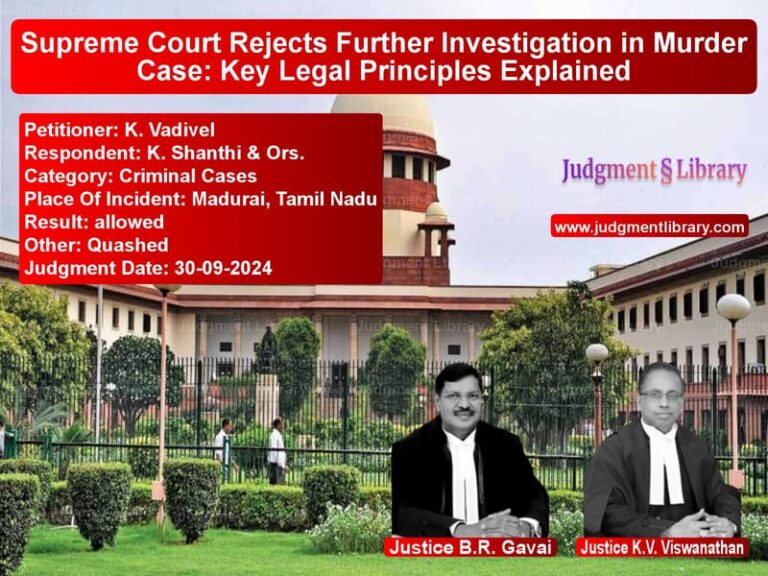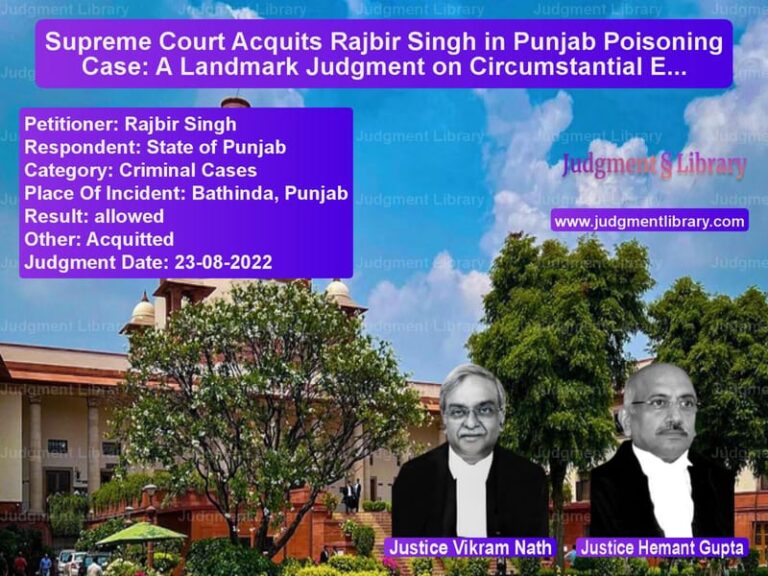Election Process Cannot Be Interrupted: Supreme Court on Dental Council Nomination Dispute
The Supreme Court of India, in the case of Shaji K. Joseph vs. V. Viswanath & Others, has ruled that courts should not interfere in election processes once they have commenced. The case involved the election of a member to the Dental Council of India under the Dentists Act, 1948 and the Dental Council (Election) Regulations, 1952.
The Court reaffirmed the principle that once an election process begins, disputes related to eligibility and nominations should be resolved through statutory remedies provided in the governing laws rather than through direct court intervention. The ruling upholds the integrity and efficiency of electoral processes.
Background of the Case
The case arose when V. Viswanath (Respondent No.1) sought to contest an election for a position in the Dental Council of India. His nomination was rejected by the Returning Officer on the grounds that his name was not included in Part A of the register of dentists for the State, a requirement under the election regulations.
Aggrieved by this rejection, he filed a writ petition before the Kerala High Court. The Single Judge of the High Court ruled in his favor, setting aside the Returning Officer’s decision and directing a fresh election process, allowing his nomination. The present appellant, Shaji K. Joseph, who was a competing candidate, challenged this decision before a Division Bench, which upheld the Single Judge’s ruling. He then appealed to the Supreme Court.
Arguments Presented
Petitioner’s (Shaji K. Joseph) Arguments
- The Returning Officer’s rejection of V. Viswanath’s nomination was valid because his name was not in Part A of the State register, which is a mandatory requirement under the election rules.
- The final electoral roll was published on January 10, 2011, and the election schedule was notified on January 27, 2011. The rejection of any nomination after the publication of the final electoral roll was in line with legal requirements.
- Once the election process starts, courts should not interfere. The appropriate remedy was to challenge the election result after its completion, as per Section 5 of the Dentists Act, 1948, which allows disputes to be referred to the Central Government.
- The High Court erred in setting aside the election process and directing a fresh election, which disrupted the entire electoral process.
Respondent’s (V. Viswanath) Arguments
- He was a registered dentist with a recognized qualification, and therefore, he was eligible to contest the election, even if his name was not included in Part A of the State register.
- The rejection of his nomination was unjustified and against the spirit of the Dentists Act.
- The High Court correctly intervened to protect his rights and ensure a fair election process.
Supreme Court’s Ruling
The Supreme Court, in a judgment delivered by Justices Anil R. Dave and Adarsh Kumar Goel, ruled in favor of the appellant, Shaji K. Joseph, and set aside the High Court’s judgment. The Court emphasized the following points:
1. Election Process Cannot Be Disrupted
The Court reiterated a well-established principle that once an election process has begun, courts should not intervene. The judgment cited previous rulings, including:
- N.P. Ponnuswami vs. Returning Officer (1952), which held that courts should not interfere with elections once the process starts.
- Sant Sadguru Janardan Swami (Moingiri Maharaj) Sahakari Dugdha Utpadak Sanstha vs. State of Maharashtra (2001), which upheld the principle that election disputes should be settled only after the election process is completed.
“Whenever the process of election starts, normally courts should not interfere with the process of election for the simple reason that if the process of election is interfered with by the courts, possibly no election would be completed without court’s order.”
2. Alternative Remedy Exists Under the Dentists Act
The Court highlighted that Section 5 of the Dentists Act, 1948, read with Regulation 20 of the Dental Council (Election) Regulations, 1952, provides a mechanism for resolving election disputes. Under these provisions, any dispute regarding an election must be referred to the Central Government, whose decision is final.
“Whenever any dispute arises in the course of election, it should be referred to the Central Government, whose decision shall be final.”
The Court noted that the High Court should have directed the respondent to approach the Central Government instead of interfering in the election process.
3. Nomination Criteria Were Clear
The Supreme Court observed that under Section 3(a) of the Dentists Act, 1948, members of the Dental Council are elected by registered dentists in Part A of the State register. Since V. Viswanath was not in Part A, his nomination was rightly rejected.
4. High Court’s Order Was Incorrect
The Court concluded that the High Court had erred in setting aside the nomination rejection and directing a fresh election. Such interference was unwarranted and disrupted the election process.
Final Verdict
The Supreme Court allowed the appeal and ruled that:
- The High Court’s order setting aside the Returning Officer’s decision was quashed.
- The election process should proceed as originally scheduled.
- If V. Viswanath wished to challenge the election, he must approach the Central Government under Section 5 of the Dentists Act.
- There would be no issue of limitation if he initiated this action within four weeks.
Conclusion
This ruling reinforces the importance of maintaining the integrity of election processes and ensuring that courts do not intervene unnecessarily. The Supreme Court’s decision establishes the following key takeaways:
- Courts should not interfere in election processes once they commence.
- Election disputes should be resolved through statutory remedies provided in the governing laws.
- In professional body elections, candidates must meet all eligibility criteria outlined in the relevant laws and regulations.
This case serves as a crucial precedent for future election-related disputes, ensuring that democratic and legal processes are followed without unnecessary judicial intervention.
Don’t miss out on the full details! Download the complete judgment in PDF format below and gain valuable insights instantly!
Download Judgment: Shaji K. Joseph vs V. Viswanath & Other Supreme Court of India Judgment Dated 22-02-2016-1741852779365.pdf
Direct Downlaod Judgment: Direct downlaod this Judgment
See all petitions in Public Interest Litigation
See all petitions in Legislative Powers
See all petitions in Judgment by Anil R. Dave
See all petitions in Judgment by Adarsh Kumar Goel
See all petitions in allowed
See all petitions in supreme court of India judgments February 2016
See all petitions in 2016 judgments
See all posts in Election and Political Cases Category
See all allowed petitions in Election and Political Cases Category
See all Dismissed petitions in Election and Political Cases Category
See all partially allowed petitions in Election and Political Cases Category

